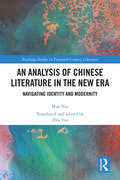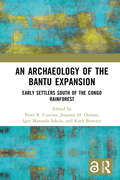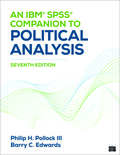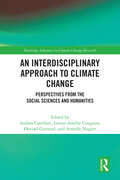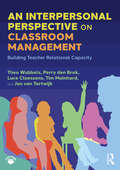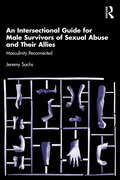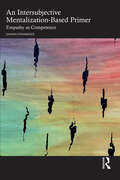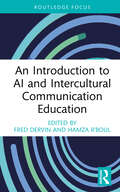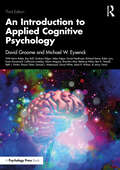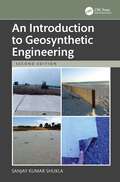- Table View
- List View
Amplify CKLA, Grade 5, Unit 2, Reader: Early Americas, Civilizations and Empires
by Amplify Education Inc.NIMAC-sourced textbook
Amplify CKLA, Grade 5, Unit 5, Reader: Life in the Fathoms
by Amplify Education Inc.NIMAC-sourced textbook
Amplify CKLA, Grade 5, Unit 6, Reader: Cultures and Histories, Native Americans
by Amplify Education Inc.NIMAC-sourced textbook
Amplify CKLA, Grade 5, Unit 8, Reader: The Renaissance: Patrons, Artists, and Scholars
by Amplify Education Inc.NIMAC-sourced textbook
Amplify CKLA, Grade 5, Unit 8, Reader: William Shakespeare’s A Midsummer Night’s Dream
by Amplify Education Inc.NIMAC-sourced textbook
Amplify Desmos Math, Algebra 1, Volume 4: Units 7–8
by Illustrative Mathematics. ImNIMAC-sourced textbook
An Analysis of Chinese Literature in the New Era: Navigating Identity and Modernity (Routledge Studies in Twentieth-Century Literature)
by Mao NieAn Analysis of Chinese Literature in the New Era serves as an essential window for international audiences to understand the rapid development of China over more than three decades and offers a critical interpretation of Chinese literature during this time. Due to the multifaceted influences of politics, economy, and cultural traditions, this literature has navigated an extraordinary path. The complexity of the writers' personalities, the ambiguity, the richness of artistic techniques, and the obscurity of textual themes are all characteristic representations of the work. These aspects have become part of the reflection of China's politics, economy, and culture following the reform and opening-up policy, infiltrating the daily lives of the Chinese people. Chinese writers' study and emulation of international authors have allowed Chinese literature in the new era to continue its progress on the path of modernization in world literature, creating a unique landscape in the realm of Third World literature and solidifying the foundation for dialogue with First World literature.
An Archaeology of the Bantu Expansion: Early Settlers South of the Congo Rainforest
by Koen Bostoen Peter R Coutros Jessamy H. Doman Igor Matonda SakalaThe Bantu Expansion is one of the most intriguing issues in African history. Based on extensive fieldwork in the Democratic Republic of the Congo and laboratory analysis, this book provides the most comprehensive, up-to-date, and multi-proxy account of the first Bantu speakers south of the Congo rainforest.This volume begins with state-of-the-art reviews of the archaeological, palaeoenvironmental, genetic, linguistic, and oral historical contexts of the Bantu Expansion and includes evidence from over 150 previously unknown archaeological sites with extensive analyses of pottery, lithics, soil stable isotopes, phytoliths, charcoal, and human remains. Seven appendices contain the full metadata, radiometric, and geographical data for each site and comparative language data. The volume concludes with a sweeping interdisciplinary reconstruction of the first Bantu-speaking settlers in the Kwilu-Kasai region and rethinks how farming, climate change, and contact with Central African hunter-gatherers and Ubangi speakers impacted their lifeworld.This book is indispensable for scholars and students of Africa from a wide variety of fields such as archaeology, palaeoecology, linguistics, population genetics, history, and anthropology, and of considerable interest to scientists active in other parts of the world. All who think African history matters will find it a valuable source.
An IBM® SPSS® Companion to Political Analysis
by Philip H. Pollock Barry Clayton EdwardsIn Phillip H. Pollock III and Barry C. Edwards′ trusted An IBM® SPSS® Companion to Political Analysis workbook, students dive headfirst into actual political data and work with a software tool that prepares them not only for future political science research but the job world as well. Students learn by doing with new guided examples, annotated screenshots, step-by-step instructions, and exercises that reflect current scholarly debates in American political behavior and comparative politics. The Seventh Edition has been thoroughly revised to break up larger chapters for a more detailed and focused exploration of key topics. This edition has also been updated to reflect current datasets from the General Social Survey (GSS) and American National Election Studies (ANES), including new variables related to the 2020 presidential election, ensuring students are working with relevant and up-to-date political science data. Datasets are all compatible with all post-12 releases of SPSS.
An IBM® SPSS® Companion to Political Analysis
by Philip H. Pollock Barry Clayton EdwardsIn Phillip H. Pollock III and Barry C. Edwards′ trusted An IBM® SPSS® Companion to Political Analysis workbook, students dive headfirst into actual political data and work with a software tool that prepares them not only for future political science research but the job world as well. Students learn by doing with new guided examples, annotated screenshots, step-by-step instructions, and exercises that reflect current scholarly debates in American political behavior and comparative politics. The Seventh Edition has been thoroughly revised to break up larger chapters for a more detailed and focused exploration of key topics. This edition has also been updated to reflect current datasets from the General Social Survey (GSS) and American National Election Studies (ANES), including new variables related to the 2020 presidential election, ensuring students are working with relevant and up-to-date political science data. Datasets are all compatible with all post-12 releases of SPSS.
An Interdisciplinary Approach to Climate Change: Perspectives from the Social Sciences and Humanities (Routledge Advances in Climate Change Research)
by Armelle Nugier Andrea Catellani Louise-Amélie Cougnon Øyvind GjerstadThis book offers a comprehensive overview of the ways in which research and perspectives from the social sciences and humanities can be combined for a more effective understanding of climate change and its impacts. Climate change affects all aspects of life, influencing personal lifestyle choices and political perceptions. Beyond legal and political measures, the engagement of individuals and local communities has become essential for necessary systemic change. Understanding the complex human and social dynamics is key to achieving real change, in favour of a resilient and low-carbon future.This book highlights the theoretical and practical contributions of the social sciences and humanities in understanding how humans perceive and respond to climate change, and the ways in which they can be combined to fight climate disruption and its effects. These interdisciplinary approaches draw upon fields such as communication sciences, linguistics, psychology, anthropology, educational sciences, management studies, and philosophy, to explore the nexus between climate change and human and social dynamics in individual, collective, and political actions.Drawing on a wide range of interesting case studies, the book highlights opportunities for collaboration between disciplines by combining methodological and theoretical components and synthesizing the research results. Ultimately, the book demonstrates that a more effective collaboration between the social sciences and humanities is required to fully understand the complexities of our relationship with climate change, and to pave the way to a real ecological transition. The book will be of use to scholars, students, researchers, and practitioners interested in communication studies, psychology, linguistics, sociology, philosophy, management, educational studies, transition studies, and connected fields.
An Interpersonal Perspective on Classroom Management: Building Teacher Relational Capacity
by Tim Mainhard Theo Wubbels Perry den Brok Luce Claessens Jan van TartwijkEffective classroom management is an essential skill for teachers and student teachers alike. Packed full of practical examples and evidence-informed guidance, this book offers a comprehensive approach to classroom management that emphasises the importance of building positive teacher-student relationships and fostering a supportive classroom climate that promotes student well-being, engagement, and learning.Drawing from interpersonal theory, 40 years of research in the field, and the authors’ own experiences as teachers and teacher educators, this book offers a deeper understanding of classroom dynamics and provides strategies for navigating various classroom situations. Insightful real-life examples and hands-on practical strategies are provided throughout, as well as tools, individual and team assignments, and best practice for addressing teacher-student interactions and relationships. Its contents will help both novice and experienced teachers manage classrooms for the benefit of student development. It effectively guides readers around teacher relationships and styles, interactions during a variety of classroom situations, responding to challenging student behaviours, and creating a psychologically safe classroom.This book is an essential read for teachers, student teachers, and teacher educators across all education grade levels and subject areas who are seeking to enhance their classroom management knowledge, skills and courses. The book caters to educators at different stages of their careers, from novice teachers aiming to establish a solid foundation to experienced educators interested in refining their interpersonal approaches to classroom management.
An Intersectional Guide for Male Survivors of Sexual Abuse and Their Allies: Masculinity Reconnected
by Jeremy SachsFew experiences carry more shame, stigma, and misunderstanding than the life-altering trauma of sexual abuse. Men who experience sexual abuse and rape, often find themselves marginalised and isolated, yet there are few resources available for them or those who support them.This book examines the impact of sexual abuse on different men through an intersectional lens, exploring how their unique identities, circumstances, and society's views affect their recovery or compound their trauma. Each chapter addresses a topic chosen by hundreds of male survivors who have attended the author’s recovery groups. It includes survivor testimonies, signposts to resources, and reflective activities to help manage the aftermath of sexual trauma. With statutory services, such as the criminal justice system, often failing male survivors, the book draws on Transformative Justice principles to suggest alternative ways for men to break cycles of trauma and move forward with their lives.Aimed at male survivors and those who support them—counsellors, psychotherapists, social workers, family members, and loved ones—this book offers guidance and hope for navigating a path to healing.
An Intersubjective Mentalization-Based Primer: Empathy as Competence
by Johann SteinbergerThis book explores how Affect Resonance Training (ART), as developed by the Viennese psychotherapist Johann Steinberger, offers students and trainees in psychosocial professions the opportunity to develop competence in empathy, allowing them to better understand themselves and others.Based on concepts of empathy, resonance and mentalization, this innovative mode of teaching offers effective tools and training for empathetic understanding. This book presents clear instructions for its application in the classroom, summarizing several years of intensive institutional practice. The book also outlines the program’s rich theoretical background and documents its empirical effectiveness.With clear instruction on the use of ART and clinical insights on how increased empathy is effective in therapeutic settings, this book is essential reading for psychoanalysts, psychotherapists, and others across the psychosocial professions.
An Introduction to AI and Intercultural Communication Education (New Perspectives on Teaching Interculturality)
by Fred Dervin and Hamza R’boulAn Introduction to AI and Intercultural Communication Education is the first, historic volume to explore the intersection of AI and intercultural communication education, interrogating both the transformative possibilities and ethical dilemmas posed by emerging technologies.Through diverse scholarly perspectives, the book examines how AI tools, ranging from language models such as ChatGPT and DeepSeek to generative image systems, could reshape the way we teach, research and conceptualise interculturality. While AI offers innovative opportunities for virtual exchanges, automated translation and accessible learning, it also risks reinforcing stereotypes, Western-centric epistemologies and reductive narratives if used uncritically. The contributors address pressing questions: Can AI facilitate decolonial and reflexive approaches to intercultural communication education, or does it inevitably reproduce dominant paradigms? How can educators harness the potential of AI while safeguarding against its pitfalls, such as algorithmic bias and the erasure of indigenous knowledge systems? Combining theoretical critique with case studies, the volume highlights the need for ethical frameworks that prioritise epistemic justice, pluralistic perspectives and human agency in AI-assisted intercultural communication and education.This book is an indispensable resource for students, researchers and educators interested in the complexities of technology-mediated learning, as well as the broader fields of higher education, intercultural studies and internationalisation and globalisation.
An Introduction to Applied Cognitive Psychology
by David Groome Michael EysenckThis bestselling textbook offers an accessible introduction to the application of cognitive psychology, looking at how the findings of cognitive psychologists have been put to use in real life.Using real-world scenarios and engaging everyday examples, the book offers clear explanations of how cognitive psychology can be applied in the real world, as well as the different methods, theories and models of research employed. It explores all of the major areas of cognitive psychology, including attention, perception, memory, thinking and decision making, as well as some of the factors that affect cognitive processes, such as drugs and biological cycles. The third edition has been thoroughly updated to include new material on working memory training and prospective cognition.Written by well-respected experts in the field, this textbook will appeal to all undergraduate students of cognitive psychology, as well as students of applied and forensic psychology.
An Introduction to Geosynthetic Engineering
by Sanjay Kumar ShuklaGeosynthetics, primarily made from synthetic polymers, provide efficient, cost-effective, and sustainable solutions for civil, geotechnical, and environmental challenges. Enhancing infrastructure performance with soil and rock, they are integral to global construction standards. Beyond civil engineering, their applications extend to mining, agriculture, and aquaculture. This book explores the principles, properties, and applications of geosynthetics, offering tailored solutions for innovative and sustainable infrastructure development.This updated second edition of An Introduction to Geosynthetic Engineering provides a comprehensive introduction to geosynthetics, meeting the needs of senior undergraduate and postgraduate students, practising engineers, and professionals. It includes expanded content, updated chapters, new sections, detailed site photographs, revised standards and guidelines, additional examples, and practice questions. Tailored to support both learning and practical application, this textbook is an essential resource for understanding and utilizing geosynthetics in sustainable infrastructure development.

